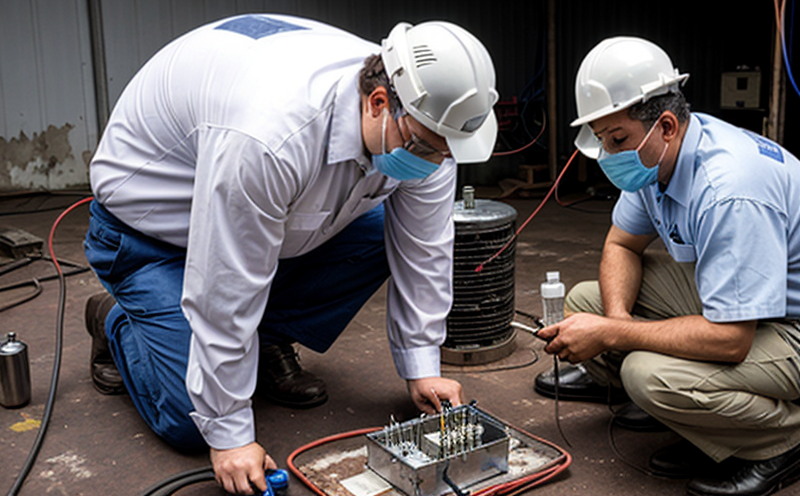Capacitor condition inspection
The inspection of capacitor conditions is a critical process in ensuring reliable and safe operation within electrical and electronic systems. Capacitors are essential components that store and release energy, playing pivotal roles in filtering, coupling, and decoupling signals across various sectors including automotive, aerospace, medical devices, renewable energy, and consumer electronics.
In the context of electrical and electronic systems inspection, capacitor condition inspections serve to evaluate the integrity and performance capabilities of capacitors under different operational conditions. This process involves a series of tests aimed at identifying potential faults or degradations in capacitance, dielectric loss, insulation resistance, and other electrical parameters that can affect system reliability.
The primary apparatus used for this inspection includes precision resistors, multimeters, oscilloscopes, and specialized test equipment such as capacitance analyzers. These tools enable the detection of minute changes in capacitance values, ensuring that capacitors meet specified performance criteria set forth by international standards like ISO 12780:2013 and IEEE C37.106.
The process typically begins with a visual inspection to identify any physical damage or abnormalities such as bulging, discoloration, or leaks. Following this, electrical tests are conducted using a capacitance analyzer to measure the actual capacitance value against its rated capacity. This is crucial for verifying that capacitors maintain their expected performance over time.
A thorough condition inspection also involves measuring dielectric loss factor (DF), which indicates how much energy is dissipated as heat during operation. An excessive DF may suggest degradation or moisture intrusion, both of which could impair capacitor efficiency and longevity. Additionally, insulation resistance testing provides insights into the overall health of the capacitor by assessing its ability to resist current flow through the dielectric material.
For critical applications where reliability is paramount—such as in aerospace or medical devices—the inspection extends beyond basic electrical tests. Here, environmental stress screening (ESS) may be employed to simulate harsh operating conditions and accelerate potential failures, ensuring that capacitors can withstand real-world challenges without compromising performance.
The importance of this process cannot be overstated; it ensures not only the longevity of electronic components but also enhances overall system reliability. By identifying issues early on, maintenance teams can implement preventive measures before failures occur, thus minimizing downtime and associated costs.
- ISO 12780:2013
- IEEE C37.106
Why It Matters
The condition of capacitors directly impacts the performance and safety of electrical and electronic systems across various industries. In sectors like automotive, where reliability is critical for preventing accidents, ensuring that capacitors function optimally can save lives by avoiding system failures due to component degradation.
In medical devices, such as heart monitors or insulin pumps, a compromised capacitor could lead to life-threatening consequences if it fails during operation. Thus, regular inspections are essential to maintain compliance with regulatory requirements and ensure patient safety.
For renewable energy installations where large arrays of capacitors are used for grid support and voltage regulation, poor condition can result in significant financial losses from reduced efficiency or even total system failure. By adhering to stringent inspection protocols, operators can extend the lifespan of these components while minimizing operational risks.
The reliability of consumer electronics products is another area where capacitor condition inspections play a crucial role. Poorly performing capacitors can lead to premature product failures, affecting brand reputation and customer satisfaction. Regular inspections help maintain consistent quality standards, thereby enhancing user experience and loyalty.
Moreover, compliance with international standards such as ISO 12780:2013 ensures that products meet global regulatory requirements, facilitating smoother trade processes between countries and fostering trust among stakeholders.
Customer Impact and Satisfaction
The impact of capacitor condition inspections on customer satisfaction is profound. For manufacturers looking to deliver high-quality products, these inspections ensure that only reliable components are used in production lines, leading to improved product performance and reduced warranty claims.
Consumers benefit from enhanced safety features provided by well-inspected capacitors in critical applications like medical devices or automotive electronics. Knowing that their purchased items meet strict quality control measures instills confidence and loyalty among customers.
For businesses operating in competitive markets, maintaining consistent product quality through rigorous inspections sets them apart from competitors who may skip crucial steps during manufacturing processes. This differentiation translates into higher market share and better financial performance.
International Acceptance and Recognition
- ISO 12780:2013: This standard specifies the requirements for the electrical characteristics of aluminum electrolytic capacitors used in electronic equipment. Compliance with this standard ensures that capacitors meet international quality benchmarks.
- IEEE C37.106: Developed by the Institute of Electrical and Electronics Engineers, this document provides guidelines for the testing, rating, selection, installation, operation, and maintenance of power factor correction capacitors in distribution systems.
- IEC 62482-1:2013: This standard covers the requirements for the electrical characteristics of solid tantalum electrolytic capacitors. It ensures that these components meet stringent quality standards recognized globally.
- CEN/TS 15973:2013: This European technical specification sets out additional requirements over and above those specified in ISO 12780 for certain types of aluminum electrolytic capacitors intended to be used under specific environmental conditions.
The acceptance and recognition of these standards by international bodies underscore their importance in promoting consistent quality across borders. Adhering to such standards not only enhances credibility but also facilitates easier market access for manufacturers who comply with global norms.





